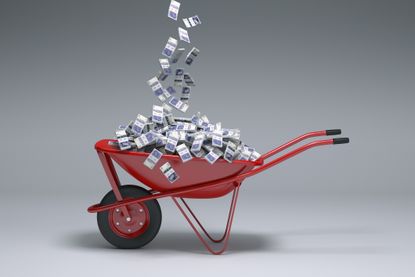Savings calculator: how to set up a savings plan
If you’re struggling to get to grips with saving, here’s our guide on how to set up a savings plan.


You may be wondering how to set up a savings plan. The secret is to get organised.
Otherwise, your savings will probably never get off the ground if all you have is a vague promise to stash away whatever’s left in your bank account before each pay-day. And there are lots of top savings accounts that could be earning you interest.
Spare cash may seem like a scarce commodity in the current climate, so it’s hardly surprising that 15% of people across the UK don’t have any savings, according to Moneyfarm and among those who do, one in three has less than £1,500.
Alice Haine, personal finance analyst at the investment platform and coaching service Bestinvest, said: “Anyone starting out on a new saving and investment journey should decide what their financial goals are so they not only know what they are funnelling away money for but also what their time horizon is.
“A short-term goal such as a summer holiday needs a very different approach to a long-term goal such as retirement, which can have a time horizon of up to 40 years or more”.
How to set up a savings plan
Before you open a shiny new savings account, it’s worth paying off any expensive debts first. This could include clearing credit or store cards that are racking up interest.
Once you’ve done this, it’s time to build up your cash savings.
Look After My Bills Newsletter
Get the best money-saving tips, tricks and deals sent straight to your inbox every week. Make sense of your money in partnership with The Money Edit.
“Your first priority should be to build an emergency fund of at least six to 12 months' worth of expenses to cover job loss, or unexpected costs such as a faulty car or broken-down boiler”, said Haine.
How much should you target to save?
There’s no fixed amount when it comes to how much you should save each month. It’ll depend on your income and outgoings.
Kevin Mountford, co-founder of Raisin UK, said: “Many experts recommend a 50%, 30%, 20% strategy. 50% of your salary is for your main living expenses, like housing (rent or mortgage), food and utility bills. 30% is for your wants, from restaurants and clothes shopping to subscriptions and gym memberships. Then, 20% can go into your savings accounts.
“A good way to save is to automatically move 20% into a savings pot, and you can do that with a standing order on pay-day”.
You can also use money apps like Chip and Plum to help make the savings process easier. Chip analyses your spending habits and works out how much it thinks you can save each month before switching the cash across.
With Plum you can set up multiple savings “pockets” for different goals, or using its money tools opt to save at certain times of the month.
You can use our calculator to work out how much you can save or how long it will take you to hit your savings goal.
What’s best - instant access or regular savings?
Easy access accounts have in the past tended to pay lower rates – with rates around 0.17% one year ago, according to the data analyst Moneyfacts.
However, savings rates are on the up, thanks to rising interest rates Some of the best savings accounts – including instant access accounts paying more than 2%. Barclays and Nationwide are even offering rates as high as 5% or more, although you will need to jump through a few hoops to get these accounts.
In terms of top regular savings deals, you can get more than 5% from Lloyds Bank, NatWest, Yorkshire Building Society. But you will need to be a customer of those banks already before applying.
Think carefully about what sort of savings account is right for you. A regular saver account may offer a higher interest rate, but there could be limits on withdrawals, and restrictions on how you can save each month.
An instant access account may have a slightly lower rate, but you’ll have more freedom over how much you save, and when to make withdrawals.
Tying up your money for longer with one, two or five-year fixed-rate accounts is another option to consider. They could pay you more interest – but the flipside is the risk of penalties if you need your cash in a hurry.
It could make sense to open several accounts, so you get the best of both worlds - high interest from a regular saver or fixed-rate account, and more flexibility from an instant-access account.
What about investing spare cash?
Saving is about putting cash aside for the short term – say next year’s holiday or a new car or kitchen – whereas investing means you’re in it for the long haul.
Kalpana Fitzpatrick, author of Invest Now and senior digital editor of MoneyWeek, said: "If you have money that you don't need to use for the long term, then it makes sense to invest the cash as your money will potentially grow faster and can beat inflation”.
“By long-term, I mean five years or more, because investments need time to grow as there will be times when the stock market does well and other times it doesn't - but over the long-term you usually see an upside.”
She added: "I would stress that it is easy to start and you do not need to be an expert - it's easy to start with a robo-advisor."
How much should you look to invest?
When it comes to investing, you don’t want to over-stretch your finances as this isn’t money you can get back in a hurry.
The advice from Kalpana Fitzpatrick is to start small to get comfortable: “Work out an affordable amount you feel comfortable with each month (say £10) and set up a standing order for that amount to go into your investment account each month”.
Further down the line, if you get a bonus at work or come into some money, you may want to increase the amount you invest.
Fitzpatrick said: “Investments do come with risk, but most people do well as long as they understand they must stay invested for five years or more, pay in consistently, and not panic when stock markets decline."
Best Buys

Sue Hayward is a personal finance and consumer journalist, broadcaster and author who regularly chats on TV and Radio on ways to get more power for your pound. Sue’s written for a wide range of publications including the Guardian, i Paper, Good Housekeeping, Lovemoney and My Weekly. Cats, cheese and travel are Sue’s passions away from her desk!
-
 Three energy firms pay £8m in switching compensation - has your provider paid out?
Three energy firms pay £8m in switching compensation - has your provider paid out?More than 100,000 customers have received compensation after changing providers, but is now a good time to switch energy suppliers?
By Tom Higgins Published
-
 Save £300 on your supermarket shop with cashback accounts
Save £300 on your supermarket shop with cashback accountsBanks, credit card companies and cashback sites are all offering cashback on your supermarket shop, but can you use them all to max out your savings?
By Vaishali Varu Published
-
 Save £300 on your supermarket shop with cashback accounts
Save £300 on your supermarket shop with cashback accountsBanks, credit card companies and cashback sites are all offering cashback on your supermarket shop, but can you use them all to max out your savings?
By Vaishali Varu Published
-
 More than 150,000 grandparents missing out on £1,500 state pension uplift: how to claim
More than 150,000 grandparents missing out on £1,500 state pension uplift: how to claimGrandparents who provide childcare by looking after their grandchildren could be missing out on valuable state pension money worth thousands. We look at how much extra you could get and if you’re eligible
By Stephanie Baxter Published
-
 Can you reclaim bank charges?
Can you reclaim bank charges?If you’ve incurred bank charges over the years, these can add up to hundreds of pounds – but can you get your money back? We look at whether you can make a claim and how to do it
By Stephanie Baxter Published
-
 HSBC extends deadline for customers to secure bigger interest-free overdraft
HSBC extends deadline for customers to secure bigger interest-free overdraftHSBC customers now have until 10 May to increase their interest-free overdraft limit from £25 to £500. First Direct, Lloyds and Nationwide also offer similar support. We explain everything you need to know
By Katie Binns Last updated
-
 New banking hub locations revealed - is there one near you?
New banking hub locations revealed - is there one near you?The rise of banking hubs is in response to a stream of local branch closes. With more planned to launch soon, we look at what services they offer and where you can find one
By Stephanie Baxter Published
-
 April 2023 premium bond winners revealed - are you a millionaire?
April 2023 premium bond winners revealed - are you a millionaire?Two premium bond holders have won £1 million each this month and there are many other prizes for another 5,018,742 winners in April. We look at how to find out if you’ve won
By Stephanie Baxter Published
-
 State pension underpayment warning - have you been underpaid and eligible for more than £11,500?
State pension underpayment warning - have you been underpaid and eligible for more than £11,500?Thousands of retirees, mainly women, are still owed money by the government after being underpaid their state pension. We explain what you need to know
By Katie Binns Last updated
-
 State pension age rise to 68 delayed - what it means for your retirement
State pension age rise to 68 delayed - what it means for your retirementThe state pension age will stay at current levels for longer than expected after the government today confirmed that it has shelved plans to increase it to 68 by the late 2030s. We explain what it all means for you
By Stephanie Baxter Last updated